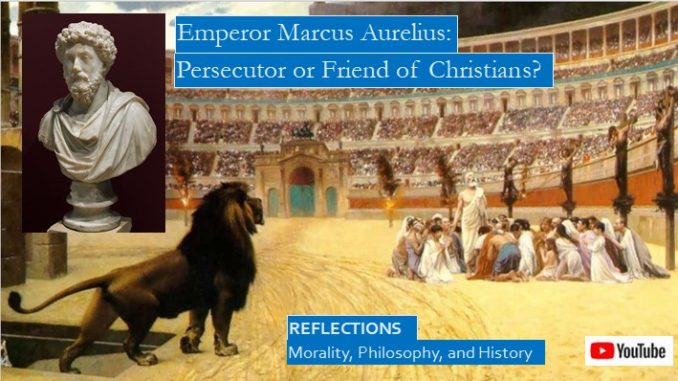
Plato in his book “The Republic” said the ideal ruler would be a philosopher-king. This wish would come true under the rein of Marcus Aurelius, the last of the five good emperors of Rome, who ruled sometime after Nero but before the first Christian emperor Constantine. Marcus was not known as a philosopher during his lifetime, for his Stoic masterpiece, “Meditations,” was penned while he was on campaign as Emperor fighting the barbarian, probably as a series of reflections for his son. The “Meditations” did not circulate widely in antiquity, but gained recognition in the centuries following his reign.
Unfortunately, Christians were persecuted during his reign as Emperor. What role did Marcus Aurelius play in these persecutions? If he believed in what he wrote in his “Meditations” he could not have strived to persecute Christians, or anyone else. Walter Kaufman in his Introduction put it this way, “a man who, for reasons of state, possibly sanctioned the persecutions of Christians, achieved a genuinely Christian depth of humility. In the words of Matthew Arnold, ‘What an affinity for Christianity had this persecutor of Christians! The effusion of Christianity, its relieving tears, its happy self-sacrifice, were the very element, one feels, for which his soul longed; they were near him, they brushed him, he touched them, he passed them by.’”[1]
We have a YouTube video on this topic that includes material not in this blog: https://youtu.be/-uQxq1O9xSY
YouTube script with more book links: https://www.slideshare.net/BruceStrom1/christian-persecutions-and-marcus-aurelius-friend-or-foe
As an admirer of the Stoic Philosophers in general, and Marcus Aurelius, Professor Luke Timothy Johnson, a devout Catholic and former Dominican monk, in his lecture series on the Greek and Roman moral philosophers, wrestles with the question of whether Marcus Aurelius actively persecuted Christians, wishing that he hadn’t, and if he had, hoping he persecuted them out of ignorance. During the reign of Marcus Aurelius, the persecutions of Christians were local and sporadic, there were no imperial directives to seek out Christians, and few were the local officials who were eager to seek out Christians to martyr, or who sought to martyr those Christians who actively sought martyrdom as a noble death. What is certain is the Christian communities during his reign were minuscule, probably less than one percent of the population, and we do not know how familiar Marcus Aurelius was with Christian teachings.[2]
We do know that during much of his reign Marcus Aurelius was leading Roman armies against the rebellious German tribes and against his opponents in Parthia in the East. Warfare was brutal in the ancient world, often the opposing army was wiped out, and the women and children and the remaining forces were sold into slavery, whether he was more merciful than most generals is hard to say.
But, Henry Chadwick in his influential history of the Early Church says with certainty that Marcus Aurelius ordered the persecution of Christians in Gaul, today’s France, writing that “the emperor Marcus Aurelius directed that the Christians should be tortured to death, and no refinement of cruelty was spared.”[3] He has no footnote for this, he likely has several sources. His primary source is the ancient author Eusebius writing his History of the Church as the time of Constantine, who goes into the gory details on these tortures for a dozen pages, although he does not directly attribute these persecutions to Marcus Aurelius.[4]
Eusebius tells us that Justin had moved to Rome and had written apologies on the Christian faith both to the emperor Pius, the emperor before Marcus, and to the Roman Senate. He got the better of the Cynic philosopher Crescens in a debate on the Christian faith, and Crescens reported him as a Christian to the emperor. Eusebius makes it clear that the emperor was involved in the martyrdoms at Rome, probably including the martyrdom of St Justin, although he does not specify whether he meant Marcus Aurelius or his co-emperor.[5]
Eusebius later reports a contrary story about a battlefield miracle when Marcus Aurelius was battling the German barbarians, his Christian soldiers prayed to God and a thunderbolt struck that “drove the enemy to flight and destruction,” and the rain that fell revived the Roman army that was “on the point of perishing from thirst.” Eusebius says that Marcus wrote letters stating that in Germany his army was saved from thirst “by the Christians’ prayers, and Marcus threatened to execute any who attempted to accuse us.” Maybe Eusebius is telling us that Marcus Aurelius came to see the light, or maybe that his sources conflict on whether Marcus Aurelius persecuted the Christians.
We do know Marcus Aurelius knew something about Christians, for in Book XI are these two observations:
“Love of one’s neighbor and truth and modesty are a property of the rational soul.”
“What a great soul is that which is ready to be separated from the body and then to be extinguished or dispersed or continue to exist. But this readiness must come from a man’s own judgment, not from mere obstinacy, as with the Christians, but considerately and with dignity and in a way to persuade another, without tragic show.”[6] Probably this was a criticism of the more fanatical Christians who actively sought martyrdom by pestering and loudly objecting to local magistrates that they would not sacrifice to the gods, behavior which was also discouraged by many bishops.
There is also a critical view of the resurrection of the soul and body in Book IV. “If souls continue to exist, how does the air contain them from eternity?” He then speculates that souls eventually diffuse to make room for other souls. Then he adds, “we must not only think of the bodies that are buried, but also the animals that are eater by us and the other animals. For these animals that are consumed are also buried in the bodies of those who feed on them!”[7] Interestingly, when St. Paul preaches to the Athenians in Acts 17, it is the doctrine of the resurrection of the dead that the Greeks have trouble accepting.
Henry Chadwick notes that “Marcus Aurelius regarded suicide as ethically unobjectionable, but felt that it must be done in good style ‘not, like the Christians in a spirit of theatricality,’ likely a quote from the Meditations.[8]
What is also very certain is the “Meditations” of Marcus Aurelius is truly a Stoic masterpiece, and that we as Christians are bid to think the best of our neighbors rather than the worst, a teaching which is also expressed in the “Meditations.” We will assume the best in this essay, that Marcus Aurelius would have encouraged Christianity if he had understood it. Indeed, the Meditations sound more Christian than the other stoic works, but rather than try to determine who influenced whom, we should merely note that both Christianity and Stoicism were both strengthening currents in the Greco-Roman sea. There are twelve books in the Meditations, is this a coincidence? Numbers in the ancient world often are significant, rarely are they accidental.
His able predecessors Trajan, Hadrian, and Antonius Pius were military men who adopted sons who would be able emperors, and these sons would gain administrative and military experience before they assumed the title of Emperor. Marcus Aurelius as the adopted son of Antonius Pius prepared for over twenty years for the time we would be emperor, and part of his preparation was to study the works of the Stoic philosophers like Epictetus, Seneca, and Cicero.
Quoting from Kaufman’s Introduction, “if the Meditations were simply another tract of mainstream Stoicism, it would likely not have emerged as a revered classic. It is precisely its unorthodox touches – its intimation of a personal god, its flashes of vulnerability and pain, its unwavering commitment to virtue above pleasure and to tranquility above happiness, its unmistakable stamp of an uncompromisingly honest soul seeking the light of grace in a dark world – that lend the Meditations its special power to charm and inspire.”
Quoting Kaufman, “Civic virtue is a mirage unless anchored in the inner virtue of each citizen; for the Stoic the best antidote to outer turmoil is inner peace. In Marcus’s words, ‘How much trouble he avoids who does not look to see what his neighbor says or does or thinks, but only to what he does himself, that it may be just and pure.’”[9] As Jesus exhorts, do not seek to see the speck in your neighbor’s eye while you ignore the log lodged in your own eye.
Historians generally count Marcus Aurelius as the last of the series of good emperors. However, Rufus Fears demurs, in his lectures on Famous Romans he contends that Marcus Aurelius was an incompetent emperor because he failed to make the difficult decisions he should have made for the good of the Roman Empire. His son Commodus was as brutal and emperor as Nero, and was assassinated for his brutality, like Nero. Commodus preferred to play the role of a gladiator rather than tend to the affairs of his empire. Also, Fears criticizes Marcus for not putting his wife when she was continually unfaithful to her, there was speculation in Rome that Commodus was conceived not by the emperor but by a brutish gladiator.[10]
Marcus Aurelius Blog 2 http://www.seekingvirtueandwisdom.com/marcus-aurelius-blog-2-others-will-be-irritating-but-not-i/
[1] Introduction probably written by Walter Kaufman, preceding Marcus Aurelius, “Meditations,” translated by George Long, revised and updated (Dover Publications, 1997), viii – ix.
[2] Luke Timothy Johnson, “Practical Philosophy, The Greco-Roman Moralists,” lectures recorded by The Great Courses, (www.thegreatcourses.com, 2002).
[3] Henry Chadwick, “The Early Church,” (Dorset Press: New York, 1967), p. 29.
[4] Eusebius, “The History of the Church,” translated by GA Williamson (Dorset Press: New York, 1965), pp. 193-205.
[5] Eusebius, “The History of the Church,” pp. 175-179.
[6] Marcus Aurelius, “Meditations,” translated by George Long, revised and updated (Dover Publications, 1997), Book XI, 85-86.
[7] Marcus Aurelius, “Meditations,” Book IV, 22-23.
[8] Henry Chadwick, “The Early Church,” p. 31.
[9] Introduction by Walter Kaufman, preceding Marcus Aurelius, “Meditations,” viii – ix.
[10] Rufus Fears, “Famous Romans,” lectures recorded by The Great Courses, (www.thegreatcourses.com, 2001).

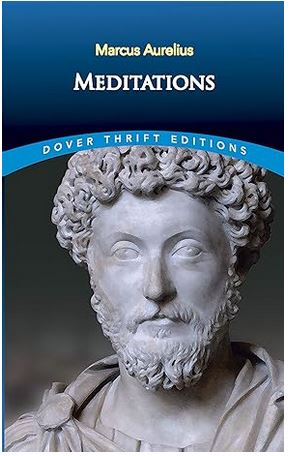
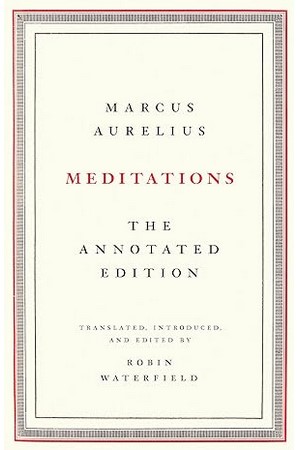
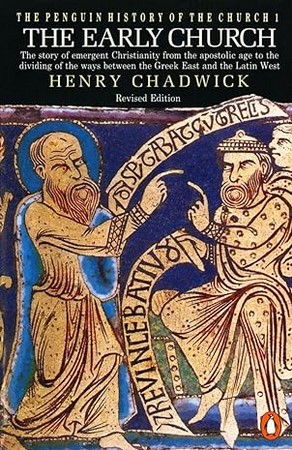
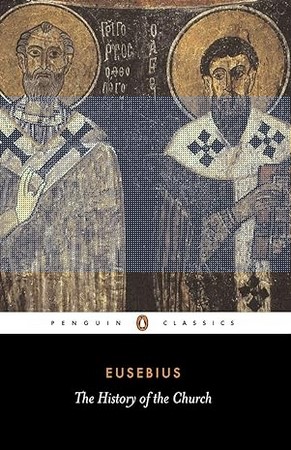
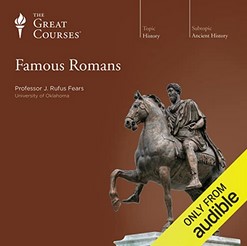
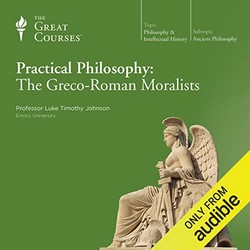
10 Trackbacks / Pingbacks